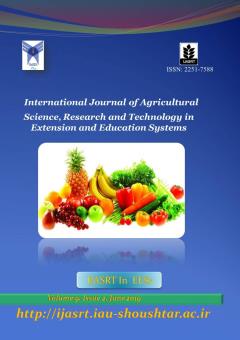-
-
List of Articles
-
Open Access Article
1 - Socio-cultural Drivers of Adaptations and Vulnerability to Climate Change: Lessons from Crop Farmers in Ondo State, Nigeria
Ademola Adegoroye Babatunde Peter Ekundayo Tolulope Olubunmi-Ajayi Olayinka Oladosu Emmanuel Oloruntoba -
Open Access Article
2 - Attitude of Follower Farmers Towards Lead Farmer Approach in Facilitating Conservation Agriculture Practices in Kalira Extension Planning Area in Ntchisi District, Malawi
Daniel Matemba -
Open Access Article
3 - Identifying and Prioritizing the Challenges of Organic Farming Development Among Farmers in Lorestan Province
Jahanbakhsh Beiranvand Ahmad Reza Ommani Azadeh N. Noorivandi Mohammad Reza Ardakani -
Open Access Article
4 - Impact of Constraints and Credit On the Probability of Participation: Evidence from Fish Producers in Nigeria
Job Nmadu Bukola Oluwatobi Oyediran Halima Sallawu -
Open Access Article
5 - Uncovering the Sustainability of Agricultural Cooperatives in East Kutai, Indonesia
Erwin Kurniawan A Nurjanana Nurjanana Ndan Imang Arfiah Busari Purwanti Purwanti Dio Caisar Darma -
Open Access Article
6 - Adaptive Analysis of Production Cooperatives with the Functions of Agricultural Innovation Management System: a Case Study of Khuzestan province
Manoochehr Alizadehnia
-
The rights to this website are owned by the Raimag Press Management System.
Copyright © 2021-2025







